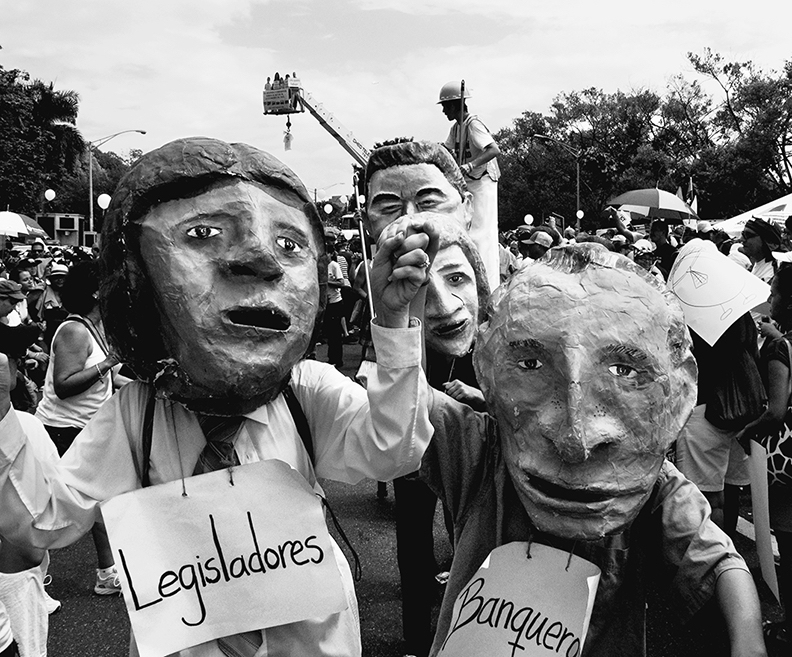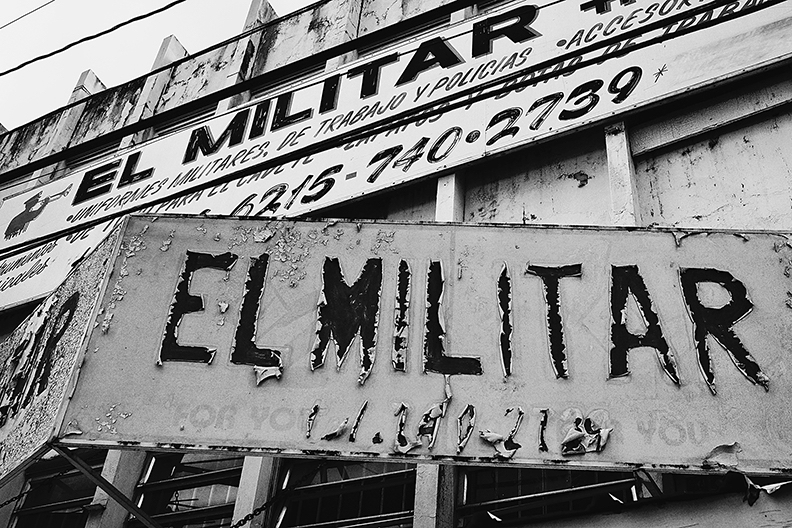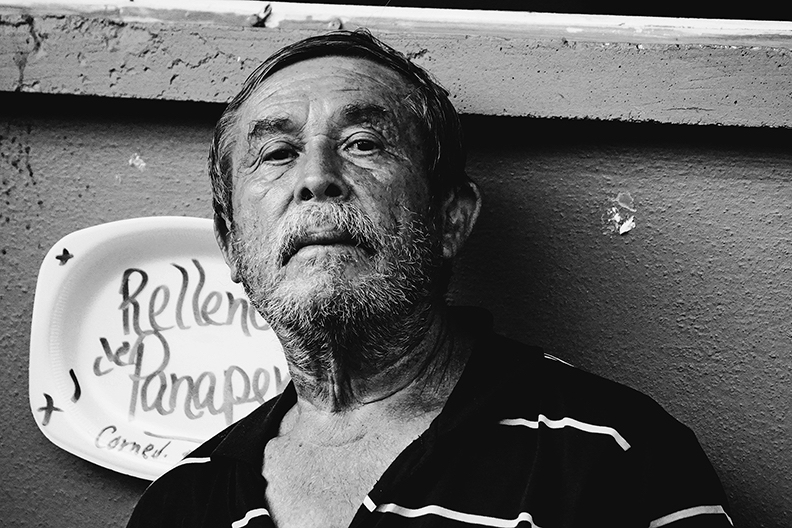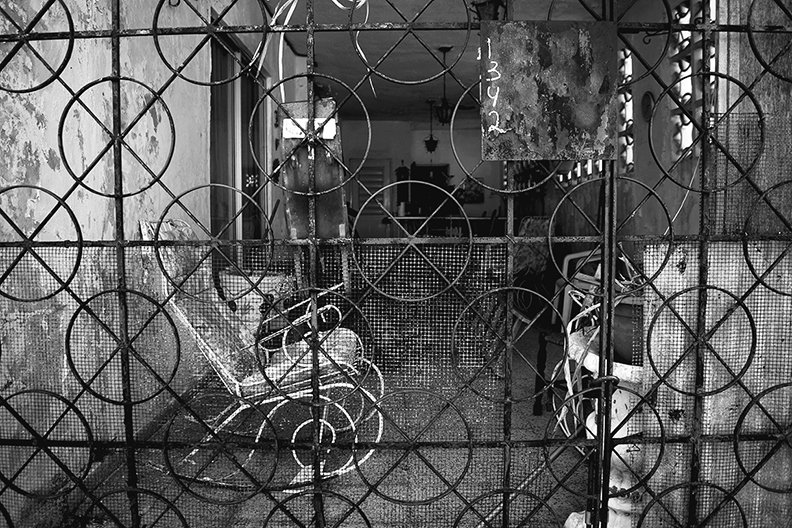
Even before the devastation of Hurricane Maria, contemporary Puerto Rico was confronting unprecedented challenges. A spiraling debt crisis, record-breaking population exodus to the mainland, and draconian cuts to public services and education led to mass protests in the streets, higher taxes, business closings, and overall poverty throughout the island. In his photo exhibition Deudos / Death Debt (Benson Latin American Collection, fall 2017), prize-winning writer and visual artist Eduardo Lalo chose photographs that, seen together or separately, make fully visible the ruinous economic, political, and social dispossession that Puerto Ricans continue to suffer at this crucial moment. We are pleased to feature several photographs from the exhibition in this issue of Portal, along with an essay Lalo read at LLILAS Benson last October at the foro urgente “Unnatural Disaster: Puerto Rico and the Caribbean after Hurricanes Irma and Maria.”
—César A. Salgado and Susanna Sharpe
Actor and comedian Bill Murray has sung West Side Story’s songs as a gesture of support to the people of Puerto Rico in the aftermath of Hurricane Maria. He even said that Puerto Ricans are Americans, in a gesture of unquestionable generosity and solidarity.
But this is not true: Puerto Ricans are not Americans, although Puerto Ricans are American citizens by virtue of the imposition of this nationality to serve the interests of the United States exactly a century ago.

In reality, Puerto Ricans are colonial subjects of the United States, and this created the framework for the dismal situation of our country, prior to the arrival of Hurricanes Irma and Maria a month-and-a-half ago. Before these hurricanes there was the unacknowledged hurricane of American colonialism in Puerto Rico. What we confront now is the result of more than a century of an asymmetrical relationship between the United States and Puerto Rico.
Donald Trump’s buffoonery in our country is not new, although it was uncommonly harsh and demeaning. Trump’s performance of media-circus sub-politics is, sadly, part of a continuum. The United States has used our despondency, be it caused by hurricanes or social factors, as a justification for exploitation and political control. Puerto Rico is conquered land in the same way as the lands of American Indians are ghettos of US citizenship. In both, the attribution of American citizenship works as a normalization of conquest and colonialism operated by successive governments of the American people.
We are not colonial subjects, we are not “American citizens residing in Puerto Rico.” We are Puerto Ricans coping with the need to eat and drink acceptable food and water. We are not just a case study of depredatory capitalism. We are Puerto Ricans: human beings hit by history and hurricanes in the American century.
What Donald Trump did in San Juan is more real than the generous singing of West Side Story’s racist and demeaning songs. We thank Murray, but at the same time we know that good intentions are media fictions. Trump’s tossing of paper towels to a selected group of privileged “American citizens residing in Puerto Rico” comes closer to the mark of what the history of our countries has been. Hurricane Maria’s relief by FEMA and the Armed Forces is just the most recent chapter of American colonialism in our country.
We are American citizens, but we are not Americans; we are Puerto Ricans. Trump knows that and acted accordingly. But he, as all his predecessors in more than a century, chose to ignore our dignity as a nation to serve his own interests and to buy time for America’s good conscience.

Hurricane Maria is not just a natural disaster, if ever such a thing exists. Hurricane Maria is a political disaster. A series of ungainly images of American colonialism in the twenty-first century. It shows the real lack of value of American citizenship when it rests in the context of the asymmetrical relationships of colonialism and when history and its responsibilities have been hijacked.
The reconstruction of the devastation will not come by the good offices of FEMA or the Army Corps of Engineers, but by Washington’s and San Juan’s confrontation of the devastation of history.
Ironically and shamefully, Donald Trump has been your more honest president. He just tossed paper and spoke his mind. He was convinced that colonialism made him able to do that without consequences. In a perverse way, he did what he was supposed to do. And that is why he incarnates without decorations or subterfuges America’s imperialistic legacy.
In four days, I will return to San Juan and will confront a familiar situation: the United States and its institutions are unable to acknowledge their duties. In the 119 years since the American invasion, the Puerto Rican people’s plights have been silenced. The American government has left us little space. That’s why we can only conceive ourselves as victims: victims of the history of American colonialism and the misguided uses of American citizenship. Or shall we say, of its fictions or of its oppressions. Until now, we have had no room to construct something else.

I don’t have with me our flag, but I can tell you it is not yours. I nevertheless will raise it here in Austin. The Puerto Rican people in the United States and in the island know that we are alone. This will be the painful lesson of this hurricane season. The best way that the United States can help us is by confronting its history, our history. We are not colonial subjects, we are not “American citizens residing in Puerto Rico.” We are Puerto Ricans coping with the need to eat and drink acceptable food and water. We are not just a case study of depredatory capitalism. We are Puerto Ricans: human beings hit by history and hurricanes in the American century.

Any real reconstruction of our country can only be accomplished if both the United States and Puerto Rico create a different relationship, a non-colonial and non-territorial relationship. If this does not happen, we will be in the same place and the same situation, waiting for the next hurricane. The reconstruction that needs to be done is not only of roads and electric grids, but of politics and citizenship. FEMA and the US Army do not defend us from the hurricanes of history. And these hurricanes do not form themselves off the coast of Africa, but in Washington and Wall Street.
In the aftermath of Maria, Puerto Rico and the United States need to start a conversation as equal members of the society of nations. Both countries need to change. This is, after food and water, after communications and electricity, our most needed hope.
Eduardo Lalo is an award-winning Puerto Rican writer and visual artist known for cross-genre books and essays that express his passion for both words and images. He is author of La isla silente (2002), Los pies de San Juan (2002), La inutilidad (2004), Donde (2005), Los países invisibles (2008), El deseo del lápiz (2010), Necrópolis (2014), and Intemperie (2016). He received the prestigious Rómulo Gallegos International Novel Prize in 2013 for his novel Simone (2011). Lalo was Joe R. and Teresa Lozano Long Visiting Professor at LLILAS during
fall 2016.
LLILAS Benson extends profound thanks to Associate Professor César A. Salgado of the Department of Spanish and Portuguese for his support and expertise in the mounting of the exhibition Deudos / Death Debt: The Art of Eduardo Lalo. During a challenging and difficult season for all Puerto Ricans, Salgado remained focused on the importance of Lalo’s voice and lens, and was instrumental in orchestrating the author’s participation in our important events on the topic of Puerto Rico.
